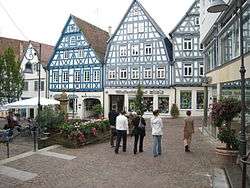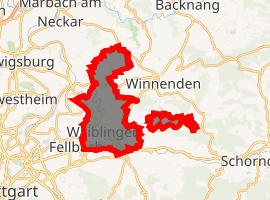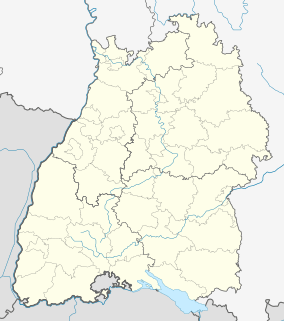Waiblingen
Waiblingen (German pronunciation: [ˈvaɪblɪŋən]) is a town in the southwest of Germany, located in the center of the densely populated Stuttgart region, directly neighboring Stuttgart. It is the capital and largest city of the Rems-Murr district. As of 31 December 2018, Waiblingen had 55,449 inhabitants (27,334 men and 28,115 women).
Waiblingen | |
|---|---|
 Waiblingen | |
 Coat of arms | |
Location of Waiblingen 
| |
 Waiblingen  Waiblingen | |
| Coordinates: 48°49′49″N 09°19′01″E | |
| Country | Germany |
| State | Baden-Württemberg |
| Admin. region | Stuttgart |
| District | Rems-Murr-Kreis |
| Government | |
| • Mayor | Andreas Hesky (Ind.) |
| Area | |
| • Total | 42.76 km2 (16.51 sq mi) |
| Elevation | 230 m (750 ft) |
| Population (2018-12-31)[1] | |
| • Total | 55,449 |
| • Density | 1,300/km2 (3,400/sq mi) |
| Time zone | CET/CEST (UTC+1/+2) |
| Postal codes | 71331–71336 |
| Dialling codes | 07151, 07146 |
| Vehicle registration | WN, BK |
| Website | www.waiblingen.de |
As of December 31, 2004, the area of the town (including all external properties, such as forests) was 42.76 km2 (16.51 sq mi).
History
Waiblingen was first mentioned in Carolingian documents in 885 at the time of Charles the Fat. It received its town charter in 1250.
Waiblingen was the property of the Salian kings, from whom the Hohenstaufen dukes and kings inherited it. It is intimately tied to the conflict between Guelphs and Ghibellines in the 12th and 13th century. During the Siege of Weinsberg in 1140, the Hohenstaufens of Swabia (led by Conrad III of Germany) used "Wibellingen" - a version of the town name - as their rallying cry; "Wibellingen" subsequently became Ghibellino in Italian.[2]
The town was almost completely destroyed in 1634 during the Thirty Years' War, when Imperial and Spanish troops sacked the city after the Battle of Nördlingen. Fires raged for more than a week, and most of Waiblingen's citizens were killed or had to flee. Rebuilding only began four years after this catastrophe; the existing old central part of the town dates back to the years between 1640 and 1700. Its fortifications are now well restored.
Incorporation
The following towns were incorporated into Waiblingen:
- December 1, 1971: Beinstein
- January 1, 1975: Bittenfeld, Hegnach, Hohenacker and Neustadt
Economy
Waiblingen houses the principal office of the world's biggest chainsaw manufacturer, Stihl. Engineering and technology multinational Robert Bosch GmbH has two factories in the city producing polymer and packaging technology.
It is also the location for the letter processing center for the Stuttgart region of the Deutsche Post.
International relations
Waiblingen is twinned with:[3]
Notable people
- Alessandro Abruscia (*1990, Waiblingen), an Italian-German footballer
- Katrin Altpeter
- Jakob Andreae
- Bernd Bachofer
- Anouschka Bernhard
- Werner Bertheau
- Alfred Biolek
- Riccardo Brutschin
- Heinz Bühringer
- Giuseppe Catizone (*1977, Waiblingen), an Italian and German footballer
- Karl Daiber
- Nelly Däs
- Luise Duttenhofer
- Eberhard II, Duke of Württemberg
- Alfred Entenmann
- Otto Esswein
- Michael Fink
- Markus Groh (*1970, Waiblingen), a German pianist[4]
- Werner Haupt
- Claus E. Heinrich
- Bodo Karcher
- Gottlob Kopp
- Nadine Krause
- Leif Lampater
- Ludwig II, Count of Württemberg-Urach
- Giorgos Machlelis (*1991, Waiblingen), a Greek-German footballer
- Bernd Mayländer
- Christian Mergenthaler
- Athanasia Moraitou
- Matthias Morys
- Christoph Niemann
- Boris Palmer
- Achim Pfuderer
- Norbert F. Pötzl
- Winfried Walz
- Manfred Wundram
Honorary citizens
- 1883: Dr. med. Gustav Pfeilsticker
- 1907: Ferdinand Küderli
- 1930: Theodor Kaiser
- 1932: Friedrich Schofer
- 1934: Albert Roller
- 1953: Emil Münz
- 1967: Alfred Diebold
- 1968: Adolf Bauer
- 1997: Dr. Ulrich Gauß
- 1997: Hans Peter Stihl (*1932, Stuttgart), a German industrialist (Stihl)
- 1997: Albrecht Villinger
References
- "Bevölkerung nach Nationalität und Geschlecht am 31. Dezember 2018". Statistisches Landesamt Baden-Württemberg (in German). July 2019.
- Chisholm, Hugh, ed. (1911). . Encyclopædia Britannica. 12 (11th ed.). Cambridge University Press. pp. 668–669.
- "Städtepartnerschaften". waiblingen.de (in German). Waiblingen. Retrieved 2019-12-02.
- official site
External links
| Wikivoyage has a travel guide for Waiblingen. |
![]()
- Chisholm, Hugh, ed. (1911). . Encyclopædia Britannica (11th ed.). Cambridge University Press.